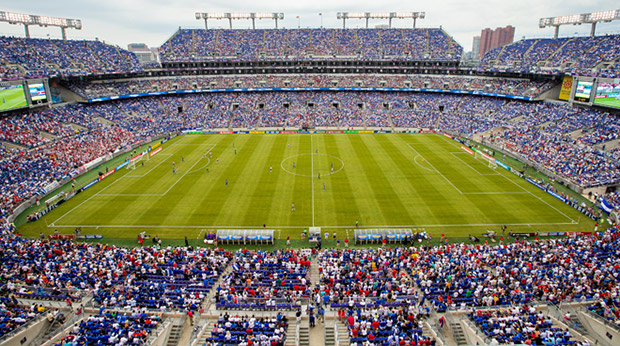By Adam Zielonka
Capital News Service
Maryland’s two NFL stadiums could be the sites of FIFA World Cup matches come 2026, and executives in Washington, D.C. and Baltimore are working to make that happen.
Washington and Baltimore are two of 32 cities vying to be named official host cities for a joint North American bid to host the 2026 World Cup.
The United Bid Committee, a partnered effort by the United States, Mexico and Canada to win hosting rights for the men’s tournament, is competing with Morocco to host that Cup. FIFA will announce its choice next June.
Representatives from the 32 cities in contention met in Houston last week for a three-day workshop to present their bids to the United Bid Committee. If North America wins, the committee would pick its official host cities by 2021, said Terry Hasseltine, the chair of Baltimore’s host committee.
M&T Bank Stadium, the home of the Baltimore Ravens, would host matches if Baltimore is chosen. Baltimore’s bid is a joint effort by the Maryland Stadium Authority, Maryland Sports (the state’s sports commission), Visit Baltimore and several other government entities. Lt. Gov. Boyd Rutherford serves as the bid’s honorary chair.
Big economic impact
The Washington bid’s proposed venue is FedEx Field in Landover, the home of the Washington NFL team. Two organizations are leading the charge: Events DC, which manages venues and convention centers in and around the District, and Destination DC, which handles marketing the city.
“Clearly the impact of soccer, or ‘the real football’ as it’s called outside the U.S., is big and this affords us the chance to play a larger role for an international audience,” said Elliott Ferguson, president and CEO of Destination DC.
Perhaps the main draw for cities in a World Cup is the revenue the matches are expected to inject into local economies. The 2014 World Cup was estimated to add $3 billion in economic impact for host country Brazil, Forbes reported.
“At the end of the day our organization is an economic development organization,” Ferguson said. “The economic impact for the city is significant.”
The cachet of a global event like the World Cup is also attractive, said Lawrence Hamm, Destination DC’s sports development manager who represented Washington in last week’s workshop.
“We’re not doing it for us… It’s the reputation of the World Cup that’s on the line, and the reputation of North America,” Hamm said.
All cities at the current stage have shown the United Bid Committee they have the infrastructure to host and transport tens of thousands of fans. At the Houston workshop, the United Bid Committee held sessions to discuss how to incorporate innovation, sustainability and human rights initiatives in the bid, Hasseltine said.
The next step for Baltimore’s bid is for Hasseltine to meet with his partners and community leaders “to get people to understand the weight and the magnitude of what was presented to us so we can meet those deadlines,” he said.
The local soccer scene
A less quantifiable factor the committee will consider is the soccer community of each city. Washington has a Major League Soccer franchise, D.C. United, and a National Women’s Soccer League team, the Washington Spirit. The city hosted matches when the United States held the 1994 World Cup, at RFK Stadium, and the 1999 Women’s World Cup, at FedEx Field. The Washington Post reported that the city was the top-rated U.S. market for television viewership through all 64 matches of the 2014 World Cup.
On the Baltimore side, Hasseltine also cited TV viewership for international matches when explaining Baltimore’s soccer community, despite the city’s lack of a pro team.
“(It) means that we have a very large community, and maybe it might be a little bit of a sleeping soccer community,” said Hasseltine, the executive director for Maryland Sports and vice president of communications for the Maryland Stadium Authority.
Regional approach eases travel
Hasseltine and Ferguson said they do not see Baltimore and Washington as being in direct competition with one another. Their proximity is an asset, Hasseltine said, because a set of group stage matches among four teams could be played in one geographic area.
“When you look at pool play, which is something we would probably fall most in line with, it is a great venue setup for them to put a pool here in the Mid-Atlantic,” Hasseltine said. “New York, Philadelphia, Baltimore and potentially D.C. Just imagine the transportation ease when you’ve got Amtrak and easy flights and I-95.”
That proximity could provide teams with ease of travel between matches — and fans as well. Many American fans have multiple rooting interests because Washington is a “transplant city,” said Melissa Wiley, the secretary of the Washington chapter of American Outlaws, a group of supporters of the U.S. men’s and women’s national soccer teams with chapters nationwide.
Wiley knows several local soccer fans who support both the U.S. team and another national team aligned with their background.
“I think you find a lot of that in D.C. because you have people who are first generation of growing up in the United States, and so they support the U.S. but they also support the team that their parents support,” Wiley said.
If Washington hosts World Cup matches in the future, it would inspire the area’s youngest generation of soccer players and fans, she added.
“It’s a completely different atmosphere,” Wiley said. “I went to Brazil in 2014 and the atmosphere of those games is so much different, so much more electric than just a regular game.”




Recent Comments